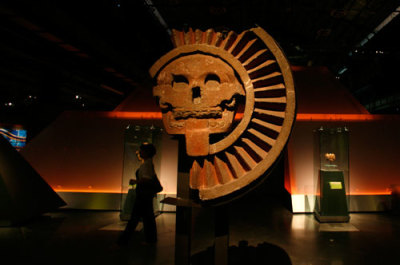Vatican, US Government Weigh in on Mayan Dec. 21, 2012 'Doomsday'

The Vatican has come forward to reassure the public that, despite claims of the world ending on Dec. 21, 2012, the Mayan calendar cited in much of the speculation does not portend Earth's doom. The U.S. government also issued a statement seeking to assure Americans that "scary rumors about the world ending in 2012 are just rumors."
The Rev. Jose Funes, director of the Vatican Observatory and the Roman Catholic organization's leading astronomer, came out this week to insist that the world will not end four days before Christmas and that the issue should not even be discussed.
The Associated Press reported that Fuentes wrote, addressing one of the theories surrounding the calendar, that indeed the universe is expanding and "if some models are correct, will at one point 'break away' – but not for billions of years." The AP added that the reverend and top Vatican astronomer reminded readers that, despite the unfounded claims of a Dec. 21 doomsday, Christians believe that "death can never have the last word."
The ancient Mayans' Long Count calendar, which ends on Dec. 21, 2012, has been interpreted by some to predict when the world come to an end.
In addition to the Vatican, and NASA scientists, seeking to address the fears of those who believe an apocalypse is on the horizon, the United States government has also put out a public notice for those concerned.
The statement on USA.gov's blog reads:
"False rumors about the end of the world in 2012 have been commonplace on the Internet for some time. Many of these rumors involve the Mayan calendar ending in 2012 (it won't), a comet causing catastrophic effects (definitely not), a hidden planet sneaking up and colliding with us (no and no), and many others."
"The world will not end on December 21, 2012, or any day in 2012," it adds.
The statement on the U.S. government's official web portal revealed that the rumors have affected both adults and children, and shared that NASA's David Morrison has reported getting messages from young children troubled by the claims of the world ending on Dec. 21.
"At least a once a week I get a message from a young person ― as young as 11 ― who says they are ill and/or contemplating suicide because of the coming doomsday," the planetary astronomer and senior NASA scientist who answers questions from the public has said.
NASA has issued many statements on the issue in addition to launching videos and even a web page to explain and answer questions about the Mayan calendar rumors. One such video, shown below, features a NASA scientist explaining why the world will not end on Dec. 21 and that it will be "just another day" like any other.
Reports have been emerging from many corners of the globe about the fearful building ark-like vessels or similar structures they believe will protect them from potential disaster on Dec. 21. One small town in Southern France has also been designated by the doomsday proponents to be home to a safe haven, in the form a mountain top called Pic de Bugarach. Some reportedly believe that the mountain's Pic de Bugarach hides space aliens at its base who are awaiting Earth's destruction before leaving and, according to the U.K. Telegraph, taking a few humans with them.Those expecting the "Mayan apocalypse" are reportedly hoping to make their escape that way.
For the Mayans' descendants, however, Dec. 21 is seen as a time of renewal, not death.
"For us, this Dec. 21 is the end of a great era and also the beginning of a new era. We renew our beliefs. We renew a host of things that surround us," Jose Manrique Esquivel, a descendent of the Maya living in Mexico's Yucatan peninsula, told The Associated Press.
Christians, meanwhile, have been reminding others that, according to the Bible, there is no known date for when the current world will meet its end.
"'No one knows about that day or hour, not even the angels in heaven, nor the son, but only the Father,'" wrote Devon O. Taylor on Twitter, referencing Matthew 24:36. "Trust in God, not the Mayan calender [sic]."
Marcos Witt, former leader of Lakewood Church's Hispanic congregation and a Grammy Award-winning singer, also tweeted: "My trust is in The Lord. Not in the Mayan calendar."





















